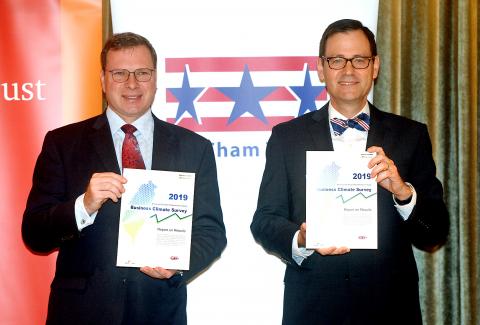US companies operating in Taiwan are significantly less confident than last year about Taiwan’s economic outlook this year, amid concerns over five key issues — trade disputes, Chinese pressure, cybersecurity, US trade policy and intellectual property rights infringement — the American Chamber of Commerce in Taipei (AmCham) said yesterday.
Based on input from 179 members, AmCham’s annual poll found that only 45.8 percent of respondents were upbeat about the outlook for this year, nearly a 10 percentage point drop from 55.5 percent last year.
However, 53.63 percent were optimistic about local growth over the next three years, slightly higher than last year’s 50.25 percent, AmCham said, adding that sound fundamentals would lend support to domestic growth and predicting that the volatility arising from the five key concerns could end in the next three years.

Photo: Lin Cheng-kung, Taipei Times
The US-China trade dispute is the biggest geopolitical threat to the local economy, followed by pressure from China over Taiwan and the US’ America first trade policy, AmCham chairman Leo Seewald told a news conference in Taipei.
Although the US and China on Dec. 3 announced a 90-day truce, 81 percent of respondents expect the dispute to last longer, Seewald said.
The survey, which was conducted from Nov. 12 to Dec. 21, included “pressure from China over Taiwan” as a geopolitical factor for the first time, with 79 percent of members expressing concern, but most companies said they would be willing to continue their operations in Taiwan as long as the environment remains stable, he said.
Power supply was once again citied as the main operational issue, with 86.59 percent voicing concern over energy sufficiency, up from 84 percent a year earlier, the survey showed.
With regards to the government’s “nuclear-free homeland by 2025” policy, member companies do not favor any kind of energy resources, but are worried how the policy would be implemented, AmCham said.
The passage of Referendum No. 16, which asked people if they agreed to abrogate Article 95-1 of the Electricity Act (電業法), has increased the uncertainty, it said.
“It does not matter how the lights go on, but it matters if they do not go on,” Seewald said.
AmCham advocates revisions to the Labor Standards Act (勞動基準法), as its members feel that current regulations are not flexible enough to meet their needs, with 55.31 percent saying labor issues are likely to be a key factor in their decisions on business expansion in Taiwan.
While more than a third of companies plan to increase employment this year, respondents are less satisfied with their companies’ ability to recruit talent, with the satisfaction rate dropping from 62 percent last year to 59 percent this year.
“It is not a significant drop, but may be a issue if it continues declining, and with young talent moving to Hong Kong and China seeking opportunities, we really need to find a way for them to stay in the nation,” Seewald said.

In Italy’s storied gold-making hubs, jewelers are reworking their designs to trim gold content as they race to blunt the effect of record prices and appeal to shoppers watching their budgets. Gold prices hit a record high on Thursday, surging near US$5,600 an ounce, more than double a year ago as geopolitical concerns and jitters over trade pushed investors toward the safe-haven asset. The rally is putting undue pressure on small artisans as they face mounting demands from customers, including international brands, to produce cheaper items, from signature pieces to wedding rings, according to interviews with four independent jewelers in Italy’s main

Japanese Prime Minister Sanae Takaichi has talked up the benefits of a weaker yen in a campaign speech, adopting a tone at odds with her finance ministry, which has refused to rule out any options to counter excessive foreign exchange volatility. Takaichi later softened her stance, saying she did not have a preference for the yen’s direction. “People say the weak yen is bad right now, but for export industries, it’s a major opportunity,” Takaichi said on Saturday at a rally for Liberal Democratic Party candidate Daishiro Yamagiwa in Kanagawa Prefecture ahead of a snap election on Sunday. “Whether it’s selling food or

CONCERNS: Tech companies investing in AI businesses that purchase their products have raised questions among investors that they are artificially propping up demand Nvidia Corp chief executive officer Jensen Huang (黃仁勳) on Saturday said that the company would be participating in OpenAI’s latest funding round, describing it as potentially “the largest investment we’ve ever made.” “We will invest a great deal of money,” Huang told reporters while visiting Taipei. “I believe in OpenAI. The work that they do is incredible. They’re one of the most consequential companies of our time.” Huang did not say exactly how much Nvidia might contribute, but described the investment as “huge.” “Let Sam announce how much he’s going to raise — it’s for him to decide,” Huang said, referring to OpenAI

The global server market is expected to grow 12.8 percent annually this year, with artificial intelligence (AI) servers projected to account for 16.5 percent, driven by continued investment in AI infrastructure by major cloud service providers (CSPs), market researcher TrendForce Corp (集邦科技) said yesterday. Global AI server shipments this year are expected to increase 28 percent year-on-year to more than 2.7 million units, driven by sustained demand from CSPs and government sovereign cloud projects, TrendForce analyst Frank Kung (龔明德) told the Taipei Times. Demand for GPU-based AI servers, including Nvidia Corp’s GB and Vera Rubin rack systems, is expected to remain high,